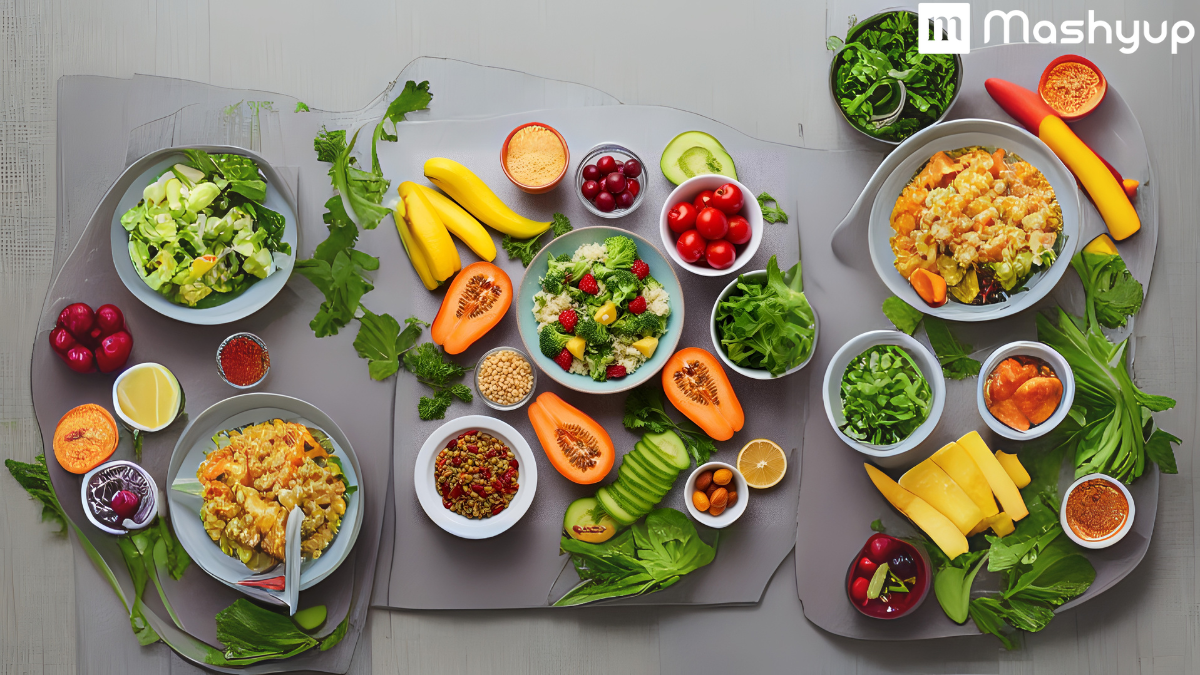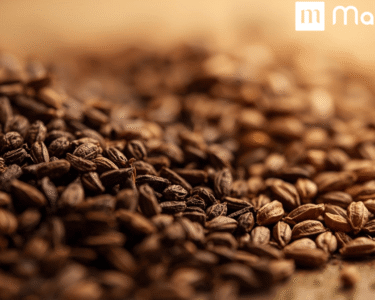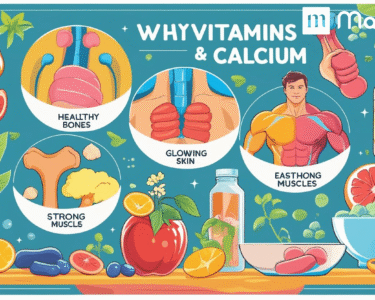Protein is essential for a healthy body, it promotes muscular growth, cell repair, immunological function, and hormone synthesis. Eating foods high in protein is crucial for weight management, muscular growth, and general health improvement.
We’ll go over the top benefits of having protein in your diet, a thorough list of protein-rich foods, and how much protein your body requires everyday.
Find out How Much Protein You Need Daily ?
We need to understand that protein needs are not one-size-fits all things, and hence the protein requirement for each body is different. Our daily protein intake depends on a number of factors, which include age, gender, body weight, activity level as well and your fitness goals. Meeting our daily protein requirement helps us stay energized, supports muscle growth, and maintains overall health.
Let’s learn this requirement through a simple table :
| Lifestyle | Protein Requirement (g/kg) | Example(70 kg person) |
| Sedentary Adults | 0.8 g/kg | 56 grams/day |
| Endurance Athletes | 1.2 – 1.6 g/kg | 84 – 112 grams/day |
| Active lifestyle (light workouts) | 1.0-1.2 g/kg | 70 – 84 grams/day |
| Muscle building/strength training | 1.6 – 2.2 g/kg | 112 – 154 grams/day |
| Fat Loss with muscle retention | 1.8 – 2.4 g/kg | 126 – 168 grams/day |
Want a personal Daily protein requirement ? Learn how to calculate your protein Intake
Step 1 : Note down your body weight in kilograms
Step 2 : Multiply your weight in kg by the recommended grams of protein per kg
Example :
A 60 kg individual who is active and wants to build muscle can calculate their protein requirement :
60 kg * 1.8 g = 108 grams of protein per day
Learn Why Protein Holds Real Importance in Your Everyday Diet
Immune and Hormonal Support
Proteins are rich in amino acids; hence, protein intake in your everyday diet leads to the formation of enzymes, which strengthen your immune system. Further, it also regulates our hormones and leads to more production of antibodies that protect our body.
Muscle Growth and Repair
Particularly after exercise, protein is essential for lean muscle mass growth and muscular tissue repair. For this reason, protein-rich diets are a top priority for athletes and fitness enthusiasts.
Weight Management
Protein is also popular for its huge contribution to weight management. By maintaining lean body mass, high protein meals help in fat reduction while increasing satiety and reducing the overall cravings.
Improved Metabolism
Binging upon protein rich foods leads to increased metabolism which happens due to the thermic effect of food. This TEF effect makes your body burn more calories while also helping in increased digestion.
Protein Food List : Top 20 Protein Rich Food you Can Include in Your Diet
Plant Based Protein
- Lentils
Lentils are a staple food option in Indian houses. Being popular for its numerous health benefits, it’s an excellent source of plant based protein.
Protein per 100g of cooked lentils : 9 grams
Example : Masoor, Tong, Moong
- Tofu
Tofu is an extremely rich source of plant based protein. It is made up of soya beans and hence serves as an excellent option for vegetarians. Being nutrient rich, tofu is popular for its versatile options you can opt for.
Protein per 100 g of tofu: 8 grams
- Chickpeas
Chickpeas are rich in protein and fiber and are a perfect vegetable to be used in salads or curries.
Protein in 100 g of cooked chickpeas is 9 grams
- Quinoa
Quinoa is a gluten free grain and an excellent source of protein. It has all 9 essential amino acids and hence is full of fiber.
Protein per 100 g of cooked quinoa is 4 grams
- Almonds
One of the most ideal snacking options. Almonds are also full of protein and give you the healthy fats required by your body.
Protein per 100 g of Almonds : 21 grams
- Edamame
Edamame are the young soybeans that have not matured much. They are extremely nutritious and are used abundantly in salads or as snacks.
Protein by 100 g of Edamame is 11 grams.
- Peanuts and Peanut Butter
Peanut or peanut butter can be most delicious way to add protein to the diet. This protein rich food is generally added to numerous smoothies and sandwiches to make the meal more satisfying and yummy.
Protein per 2 tablespoons of peanuts or peanut butter is 8 grams
- Pumpkin Seeds
Yes, pumpkin seeds are loaded with lots of protein, magnesium, and antioxidants. These seeds contain the most protein compared to other plant based proteins.
Protein per 100g of pumpkin seeds :19 grams
- Chia Seeds
Chia seeds are among those superfoods that are high in protein, fiber and omega 3s. People are likely to add them to smoothies, shakes, or drink them dipped in water.
Protein per 100g of chia seeds: 17 grams
- Green peas
A vegetable based option, green peas are an excellent source of protein, which you can include in your meal regularly through the abundant recipes available.
Protein by 100 g of green peas: 5 grams
- Oats
Oats are another gluten free grain that contains a high range of protein. Oats are also loaded with abundant fiber, making them an excellent option to have as breakfast bowls.
Animal Based Proteins
- Eggs
Eggs are loaded with the goodness of essential amino acids. Being a complete protein source, it can ideal option to have for breakfast or as post post-workout meal.
Protein by 1 large egg : 6 grams
- Chicken breast
Skinless chicken can be one of the best protein sources, particularly if you are looking forward to building some muscles without consuming much fat.
Protein per 100 g of chicken breast: 31 grams
- Greek Yogurt
Yogurt is one of the very popular gut friendly protein options. It is rich in probiotics and is extremely rich in fiber.
Protein per 100g of curd: 10 grams
- Cottage Cheese
Also known as Paneer, cottage cheese is popular in many vegetarian diets and is packed with casein protein. The presence of this protein slows down your digestion, helping you remain full for a long.
- Tuna
Tuna is an animal based lean protein that is also very rich in Omega-3 fatty acids. Tuna is widely used in salads and sandwiches and contains the highest protein content if compared with other animal based proteins.
Protein per 100g :29 grams
- Turkey
Turkey is the lean white meat that is very low in fat. It can be very useful for diet conscious people for its high nutritional value but low fat.
Protein per 100 g of Turkey: 29 grams
- Salmon
Salmon is another high protein food with loaded goodness of omega 3 fatty acids
Protein per 100 g: 25 grams
- Egg whites
For people who are concerned with their cholesterol levels, egg whites can be an excellent source of protein as they offer pure and lean protein.
Protein per 100 g of egg whites : 11 grams
Differentiated Protein Options for Different Diets
| Vegetarians | Vegan | Non vegetarians |
| Lentils | Edamame | Chicken |
| Paneer | Chia Seeds | Fish |
| Tofu | Chickpeas | Eggs |
| Greek Yogurt | Tempeh | Turkey |
| Almonds | Quinoa | Cottage Cheese |
Embrace a Protein-rich Lifestyle
It’s not necessary to completely change your diet to include more foods high in protein in your daily meals. There is a vast array of the greatest protein sources available, ranging from plant-based powerhouses like lentils and tofu to animal-based alternatives like chicken and eggs. Maintaining a healthy balance between these high-protein meals can promote weight reduction, increase muscle building, and enhance general wellbeing. Protein is an essential component of any diet, whether you’re a fitness fanatic or simply trying to improve your health.






